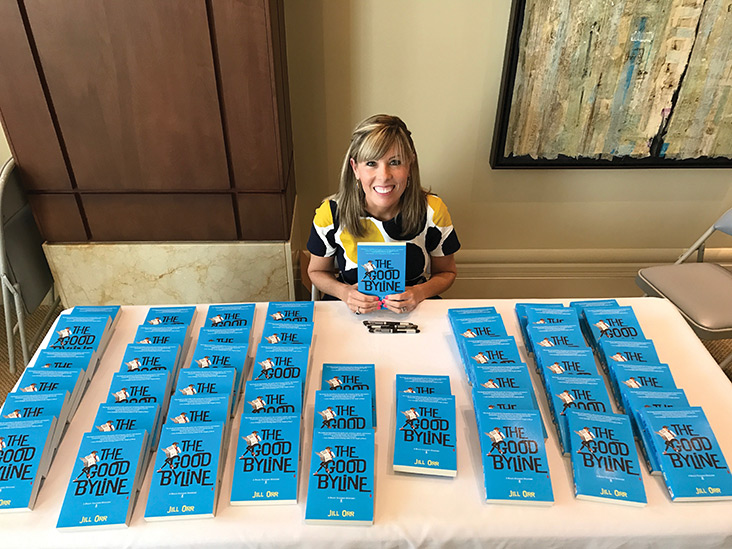Jill Orr: It’s a Bouncing Baby . . . Book!

“The Good Byline” arrives after an arduous labor.
I am now officially the parent of two teenage children and one published novel. It would be impossible for me to pick a favorite, so don’t ask. I love them all . . . in different ways. (I don’t want to name names, but I will say that some of them are less mouthy than others.) They each require untold amounts of time, attention, resources, and love. And they each cause frustration, pride, exhaustion, and joy.
My youngest is my novel, “The Good Byline.” She’s mysterious and friendly and doesn’t take herself too seriously, but I worry about her in the same way I worry about my other two. Will people be kind to her? Will she make friends? Will she find her place in the world? I suppose these are worries that all parents face, whether we’re raising babies of the flesh-and-blood variety or those made of ink and paper.
But since “The Good Byline” has made her arrival, it got me thinking about all the ways that producing a child and producing a book are different and how they are the same. For instance, it’s a well-established fact that a human baby can be brought into this world in about nine months, give or take a few days. The process goes something like this:
Baby incubates inside its host for about 40 weeks, occasionally making her sick, moody, hungry, and prone to inexplicable fits of tears and laughter, sometimes at the same time.
Baby knows when it’s ready to be born and sends its host signals in the form of painful contractions.
Host endures ridiculous levels of physical torment and a healthy dose of bodily humiliation while other people stand by and call the process “beautiful” and “brave.”
Baby casts a magic spell on the host, making her forget all the pain and suffering that led to baby’s arrival. This is the only plausible explanation for why people have more than one child.
A less well-established protocol exists for bringing a book into the world. Results may vary, but here’s a basic outline of the process:
Book incubates inside host for days or weeks or months or years, occasionally making her sick, moody, hungry, and prone to inexplicable fits of tears and laughter, sometimes at the same time.
Book emerges from host in periodic bursts of effortless inspiration set against relentless bouts of hard labor.
Host endures ridiculous levels of psychological torment and professional humiliation while other people stand by and call the process “beautiful” and “brave.”
Book casts a magic spell on the host, making her forget all the pain and suffering that led to its arrival. This is really the only plausible explanation for why people write more than one book.
And so goes the circle of life and publishing. Now, let’s hope at least one of my offspring will take care of me in my old age.
Editor’s Note: This column is Jill’s last – at least for a while. For 10 years, her vulnerability has made us laugh and feel human. We are sad to see her go, but excited for her new “parenting” endeavors.
To purchase “The Good Byline,” click here.


